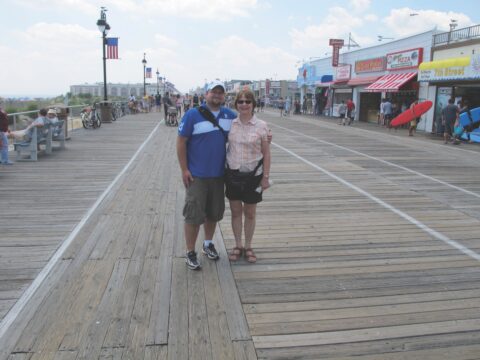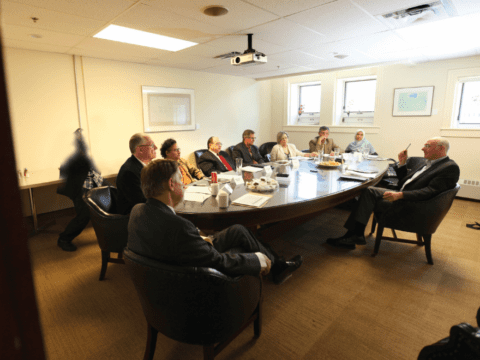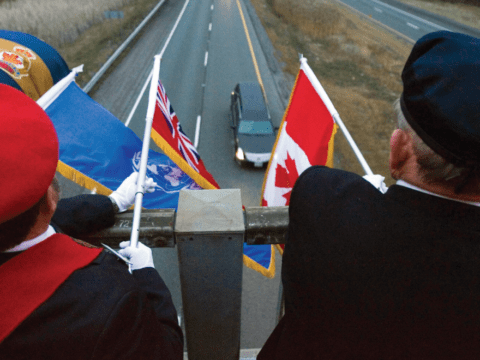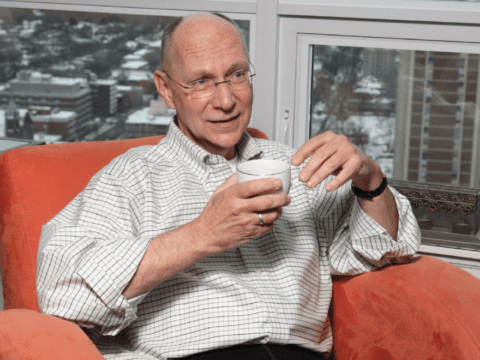A poster of Gloria Taylor’s grape-coloured ’85 Harley Super Glide motorcycle hangs in the porch of her mobile home near Kelowna, B.C. Inside, the 64-year-old rolls on a motorized wheelchair toward the kitchen, intricate black tattoos creeping up both of her shoulder blades toward her neck. An orchid droops in the centre of the kitchen table. It once had 23 flowers, she tells me; now only three sagging blooms remain. On a slip of paper, using permanent red marker, shaky hands have written, “Dying purple orchid — do not touch or water. Pls and thanks. — G”
The orchid was a birthday gift from her lawyers, one of whom is currently on the phone with Taylor, who forgot to mention that I would drop by. Media interviews are usually carefully screened by Taylor’s legal team. For good reason: Taylor is the only person in Canada who has ever received a court’s permission to ask a doctor to help her end her own life. The legal stakes couldn’t be higher.
Diagnosed in 2009 with amyotrophic lateral sclerosis (ALS), Taylor agreed last year to become a plaintiff in a B.C. Supreme Court right-to-die case. On June 15, the court granted her an exemption from Criminal Code provisions prohibiting physician-assisted suicide — or using language Taylor prefers, assisted dying — declaring the ban unconstitutional. When I visited her home in July, the federal government had just announced its appeal of the ruling.
Taylor’s lawyer is understandably nervous, but I’m not here to talk jurisprudence. Instead I ask Taylor, who loves to write, how she would write her own story. She says it would begin when she is a little girl in Sunday school, where she fell in love with Bible stories. Moses was her favourite character — a soft-looking man with a flowing gown and a big beard. In her vivid imagination, she began picturing God this way, even though she understands God as a spirit rather than a person.
Then she’d move through her 20s. She would write about working, advocating and her 14-year run mothering foster children. These are the sides of Taylor people don’t read about. One day, Taylor says, she’ll jot down a list of all the jobs she’s had. She lists only a few for me: managing a park, supervising federal parolees, flipping burgers, working in chicken joints, housekeeping and, most recently, working in a group home for adults with disabilities.
Now retired, Taylor has suddenly become a cause célèbre. While some cheer her on vigorously (sometimes seeking the same court exemption), others use her words as ammunition, arguing that the right to assisted dying is a slippery slope, putting vulnerable people at risk of being killed without their consent.
As I sat with her that day, our conversation about advocacy turned to the topic of God. Below are excerpts from my interview with Taylor about her time spent living, fighting to die and journeying in faith as a member of The United Church of Canada.
Describe your relationship with God.
I have an awesome relationship with God. It’s definitely my anchor. . . . I just couldn’t fathom how anybody could go through this kind of experience with this kind of a disease without a faith. My mother’s a strong believer, too. We share our faith, and you know, it seems every other day we’ll say to each other, how do people do this without a faith? . . . To deal with the turmoil? To deal with the grief, the anticipatory grief.
How do you go through this process of anticipatory grief?
I’m going through it really well, actually. I’m not saying I don’t have my moments, but basically that’s all they are — moments. I’m not going to even allow myself to do this depressed thing. That’s not even an option for me, as far as I’m thinking now.
Why not?
Why? There’s so much good to live for. When it seems like life isn’t worth living, it’s still worth living. I’m not there, so maybe that will change. But I don’t think so. These are my values, my beliefs, my strengths, my mom’s strength, my family’s strength.
This year The Observer’s reader survey showed that churchgoing readers support assisted dying more than non-churchgoers. Does that surprise you?
No, because they’re not afraid to die. They have a strong faith.
Yet there are a lot of Christians out there who don’t support the idea of assisted dying.
Well, to each their own. I’m not trying to change anybody’s mind. I’m here to make a choice for all Canadians, regardless of myself. . . . If you don’t like what I stand for, change the channel.
I let them live their life; I would just ask they let me live my life with my beliefs. What’s this protesting on the court steps? Do I go to their house or their place of work or where they have their meetings and get great big [groups of]people who believe in dying to protest on their lawns or whatever?
To me it’s really simple. I don’t know why they just don’t get it. Give me the dignity of doing what I believe in, and I’ll give you the same respect. . . . You don’t have to die a horrific death in order to go to heaven or be with the Lord. It’s all so simple. I don’t know why they make such a big to-do out of it. I really don’t.
Perhaps one of the reasons they make a big to-do out of it has to do with the slippery-slope argument —
Oh Jesus, how did I know you were going to say that?
Well, I —
I was just thinking, right now, if she says that slippery-slope thing!
Well . . . what if she says that slippery-slope thing?
I hate that slippery-slope thing! That again is so simple. I don’t understand what people don’t get. There will be guidelines in place. . . . If they read the judge’s decision, the last many pages are about me. I have to see doctors, I have to see a psychiatrist, I have to ask twice with two witnesses each time. Maybe twice to each doctor, I don’t know. I have to be of sound mind. I have to be of age. . . . I can’t just go, “Oh, today’s the day, they’ve given me this freedom and I’m going to go get a doctor and go do this.” Absolutely not.
So where do they get [that people are] going to kill their mother for the inheritance? Or terminate the life of their mentally challenged son or whatever? Where does that fit into any of those guidelines I just said? It doesn’t fit in anywhere. So what does that mean? That means, simply, you can’t do it. You won’t get permission. No doctor could do it.
My granddaughter at 12 gets it. Why can’t these guys get it? That’s why they’re the minority, I guess.
Well, are they the minority though? The federal government has pushed back now with an appeal, and they’re interested in pleasing the majority.
Because that’s what they do. That’s just about with any case, criminal or otherwise: everybody always appeals. For my part, I personally was surprised that they’re asking for my say on part of it. Like really, what’s the big deal to them whether I die or not?
So, back to the guidelines you mentioned earlier — how will you die?
I don’t know. God hasn’t told me yet.
I’ve heard you say that you’ll know when it’s time.
Yes. If I choose assisted dying, that’s only under excruciating, excruciating pain. And knowing me, and knowing how strong I am, and how I like life and I love nature and I love my family — I love my granddaughter to pieces — I can’t see me wanting to end my life because I’m in a wheelchair all the time, because I’m bedridden, because I’m incontinent. We’ll work that out somehow.
I totally live a one-day-at-a-time life. Sometimes it’s down to one breath at a time, you know? And that’s the way I’ve got to look at it.
What role does the church play for you in all this?
Well, I can’t get to church very easily, so I haven’t been going for a while. In the last several months, I’ve gotten into a wheelchair, so to even go out on my own, I have to take a cab down there because handyDART [Kelowna’s regional accessible transportation] doesn’t run on Sundays. And that gets fairly costly after a while. If somebody takes me down in my car, it means somebody transferring me out of my wheelchair, which is not always easy on somebody’s back either. I worry about that.
You told me earlier that being Christian is like being pregnant — you are or you aren’t; you can’t be just a little bit Christian. What makes you Christian?
I believe I’m Christian because I do unto others as I would have them do unto me. I help people a lot. I’ve spent my whole life helping people. And I don’t help people and expect something back. . . . I’m not prejudiced. It doesn’t matter whether it’s colour or religion, or a person’s gay or whatever. I love everybody equally, unless they’ve done harm to me; then maybe I don’t like them, but I still love them and pray for them. Everybody has their own road to go.
And I try to keep myself in check, that I’m not judging somebody, because, as I tell other people when they say, “Gee, but you look so good!” I say, “You see this happy smiling face, but under the shirt are the sunken shoulders and the sunken-in back and the sunken legs. And the hands that are, you know, all gimped up. That’s the ALS.” This pretty face, as they say, is not the real whole thing that’s happening, by a long shot.
Generally speaking, what do you think the church could do when talking about the issue of assisted dying?
I think more churches should be brave . . . and do some sermons the odd time about it, so people become comfortable with the idea. People need to become comfortable with the idea of dying.
Do you have any messages for people in congregations wondering what to make of all this?
Trust God. We all have a journey, and I believe I was chosen to go on this journey. There are millions of people in Canada. Nobody else stood up. Obviously this was part of my journey to me. I really believe I was blessed. Blessed. Blessed to be able to do this for all Canadians.
As you’re going through this journey, to use your words, has your spiritual perspective changed?
It’s stronger. There are more challenges every day for sure, and I’m meeting more people. Frustrations are much higher because I live on my own and can’t . . . go out when I want to go out, can’t drive, problems with eating, tube feeding — that’s not going the greatest. My faith is just something to hang on to, big time.
Not everyone who is anticipating dying painfully has a journey with faith. What do you say to them?
Oh, if I could give them what I have, I would so freely give it. If I could spend time with them and share with them, hopefully they would have that faith too. It’s not easy. Nobody said life would be easy, and nobody said dying would be easy either. But it can be done. So keep the faith, keep the faith. Whether it’s a small faith or a big faith, keep the faith.
So when the time comes that you’re no longer here to advocate, what do you want people to remember?
Well, I hope it’s that I fought the fight and won.
Postscript:
For now, it appears Taylor has won at least a partial victory. In early August, a B.C. judge rejected the federal government’s request to overturn Taylor’s exemption while the ruling is being appealed, saying her right to doctor-assisted suicide should not be sacrificed because the courts have yet to resolve Canada’s stance on the issue. So the door is open to Taylor, even as the larger legal battle continues. The question that remains is whether anyone will be allowed to follow in her wake.
A soft-spoken rebel, Taylor didn’t plan to become a trailblazer. When she began riding motorcycles at age 37, she would ride on the backseat. Her fellow riders often drank before driving. It terrified her. During one ride, the driver was headed toward a cliff, and Taylor had to beat him on the helmet to make him pay attention. “I was so scared,” she remembers. “I kept saying, ‘God, please, just let me get home to the trailer park and I’ll never do this again.’”
She arrived home alive, said her thanks and never got on the back of a bike again. She decided right then and there that she would learn to drive a motorcycle herself. From that day forward, she would do everything she could to take control of her life.
Now picture the younger Taylor roaring through B.C.’s Kootenay Rockies in 1990 atop that shining ’85 Harley Super Glide. The dark purple show bike with wizards and unicorns and the word “dream” engraved on its tank glides through the hills, taking each turn carefully. She’s on her way to South Dakota for the 50th anniversary Sturgis Motorcycle Rally, one of the largest biker parties on the planet. Taylor is a confident biker, but she’s too short to touch the ground. “The stupid thing nearly fell over each time I stopped,” she laughs.
Still, Taylor kept the beast upright and finished fifth among half a million other bikers. Those, she says, were the best days of her life.
***
This story first appeared in The United Church Observer’s September 2012 issue with the title “Gloria’s choice.”















